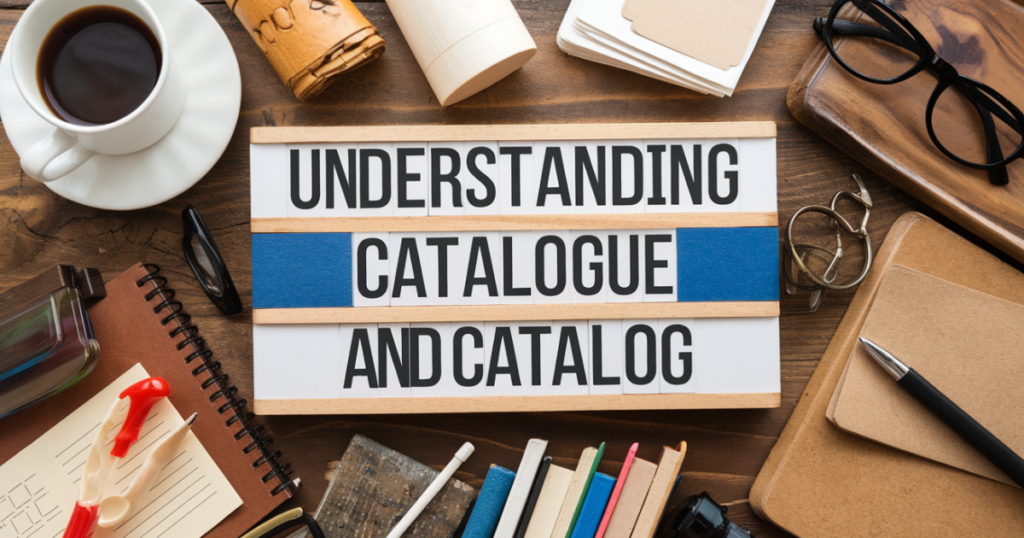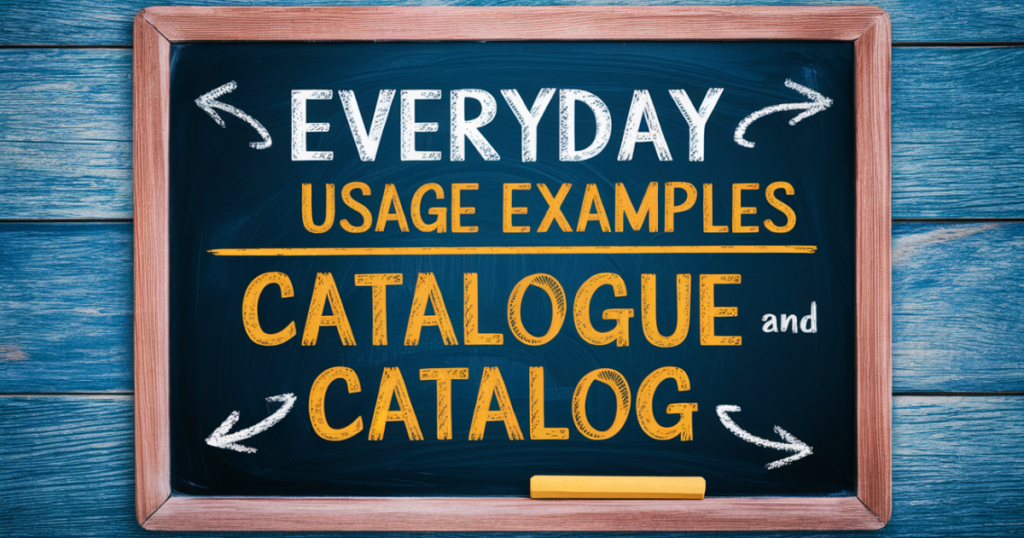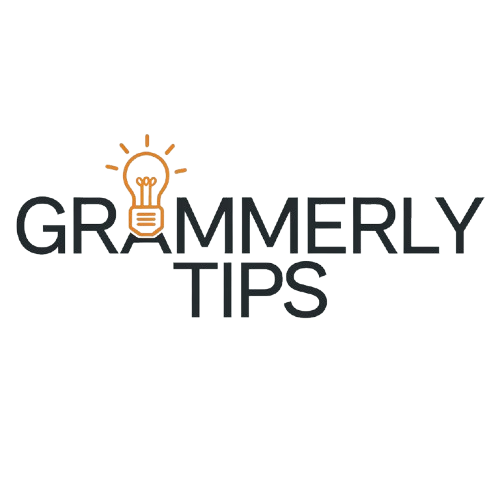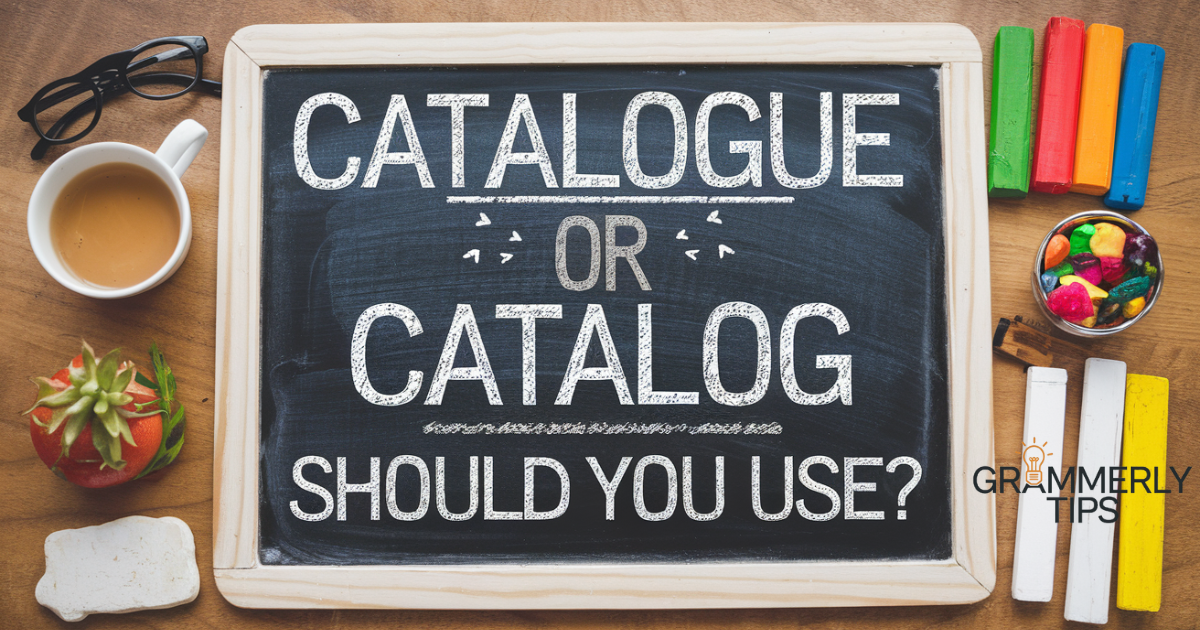Have you ever wondered whether to use catalogue or catalog? These two spellings of the same word often cause confusion, especially for those writing content that reaches international audiences. The difference may seem subtle, but it carries significance depending on your target readers and the conventions they are familiar with.
The spelling you choose can influence the tone of your writing. “Catalogue” is preferred in British English and carries a more traditional feel, while “catalog” is widely accepted in American English and gives off a modern vibe. In this article, we’ll explore the history, usage, and appropriate context for each spelling, helping you make the right choice.
Understanding Catalogue And Catalog

Catalogue: Definition and Usage
A catalogue is a detailed list or collection of items, typically organized systematically. It can refer to a printed or digital compilation, like a product or library catalogue. Catalogues provide information to help users browse, select, or understand what is offered. The term is commonly used in retail, libraries, and exhibitions.
For Examples
Library Catalogue: A library catalogue lists all available books, journals, and resources, allowing users to search and find specific items based on titles, authors, or subjects.
Product Catalogue: A clothing store’s product catalogue showcases various apparel options, with descriptions, prices, and images, making it easier for customers to browse and shop.
Catalog: Definition and Usage
A catalog is a structured list or inventory of items, often used for commercial or informational purposes. It can be printed or digital, detailing products or services with descriptions and images. Catalogs are widely used in businesses to help customers make selections. The American English spelling is “catalog.”
For Example
Online Store Catalog: An online electronics store’s catalog features a range of gadgets, including phones, laptops, and accessories, with detailed descriptions and pricing for easy online shopping.
Travel Catalog: A travel agency’s catalog provides a list of vacation packages, complete with itineraries, accommodations, and prices, helping customers plan their next trip.
You Also Like To Read This: Calender vs. Calendar: What Is the Correct Spelling?
Catalog vs. Catalogue Which Is Correct?
“Catalog” and “catalogue” are both correct, but their usage depends on the type of English you are using.
- Catalog is the preferred spelling in American English, widely used in business, retail, and digital contexts.
- Catalogue is the traditional British English spelling and is more common in the UK and other Commonwealth countries.
Both terms refer to the same thing a list or collection of items so the choice of spelling largely depends on your audience and regional conventions.
Side-by-Side Comparison
Here’s the completed table with the requested definitions and usage:
| Feature | Catalog (American) | Catalogue (British) |
| Definition | A list or inventory of items, often organized for easy reference | A list or inventory of items, typically used in academic, business, or retail contexts |
| Common Usage | Used in American English for businesses, digital platforms, and retail | Used in British English for both formal and traditional contexts, including libraries and retail |
| Key Difference | Shorter spelling, commonly used in the U.S. | Longer spelling, used in the U.K. and Commonwealth countries |
While “catalog” is the standard spelling in American English, “catalogue” remains the traditional choice in British English. Despite this difference, both words mean the same thing a systematic list or inventory of items. The choice of spelling depends on the regional preferences of your target audience, but both are considered correct in their respective regions.
Everyday Usage Examples

Catalogue (British English)
- “Catalogue” is the traditional British English spelling of a systematic list or inventory of items.
- It is commonly used in formal, academic, and retail settings, especially in the UK and Commonwealth countries.
- The term is often seen in contexts like library catalogues, exhibition catalogues, and printed product lists.
- “Catalogue” is considered more formal, and its longer spelling gives it a slightly traditional or classical feel.
Catalog (American English):
- “Catalog” is the preferred spelling in American English, widely used in business and digital contexts.
- It is frequently used to refer to online product listings, digital inventories, and business directories in the U.S.
- The term “catalog” is more common in casual and modern settings, aligning with American English’s preference for simpler spellings.
- It is used in various industries, including retail, education, and technology, to organize and display products or information.
FAQs
What is the difference between catalogue and cataloguing?
“Catalogue” refers to a list or inventory of items, while “cataloguing” is the process of creating or organizing such a list. “Catalogue” is a noun, and “cataloguing” is a verb.
How do you spell card catalog?
In American English, it is spelled “card catalog.” In British English, it would be spelled “card catalogue.”
Is catalog or catalogue British?
“Catalogue” is the British English spelling, commonly used in the UK and other Commonwealth countries.
What is the British word for catalogue?
The British word for “catalogue” is “catalogue” itself; there is no alternate term, just a different spelling from the American “catalog.”
How do you spell cataloguing in British English?
In British English, it is spelled “cataloguing” with a “u” included.
Conclusion
In conclusion, the difference between “catalog” and “catalogue” mainly comes down to regional spelling preferences. “Catalog” is the preferred spelling in American English, while “catalogue” is used in British English. Both terms refer to the same concept, a list or inventory of items, but their usage varies based on location and context.
Additionally, related terms like “cataloguing” also follow this spelling distinction. Understanding these differences ensures your writing aligns with the correct conventions for your intended audience.

Grammerlytips.com, authored by Jame, offers expert tips and insights on mastering grammar, enhancing writing skills, and boosting communication effectiveness.

